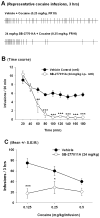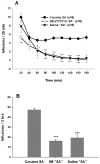Selective dopamine D3 receptor antagonism by SB-277011A attenuates cocaine reinforcement as assessed by progressive-ratio and variable-cost-variable-payoff fixed-ratio cocaine self-administration in rats
- PMID: 16026480
- PMCID: PMC3726031
- DOI: 10.1111/j.1460-9568.2005.04159.x
Selective dopamine D3 receptor antagonism by SB-277011A attenuates cocaine reinforcement as assessed by progressive-ratio and variable-cost-variable-payoff fixed-ratio cocaine self-administration in rats
Abstract
In rats, acute administration of SB-277011A, a highly selective dopamine (DA) D(3) receptor antagonist, blocks cocaine-enhanced brain stimulation reward, cocaine-seeking behaviour and reinstatement of cocaine-seeking behaviour. Here, we investigated whether SB-277011A attenuates cocaine reinforcement as assessed by cocaine self-administration under variable-cost-variable-payoff fixed-ratio (FR) and progressive-ratio (PR) reinforcement schedules. Acute i.p. administration of SB-277011A (3-24 mg/kg) did not significantly alter cocaine (0.75 mg/kg/infusion) self-administration reinforced under FR1 (one lever press for one cocaine infusion) conditions. However, acute administration of SB-277011A (24 mg/kg, i.p.) progressively attenuated cocaine self-administration when: (a) the unit dose of self-administered cocaine was lowered from 0.75 to 0.125-0.5 mg/kg, and (b) the work demand for cocaine reinforcement was increased from FR1 to FR10. Under PR (increasing number of lever presses for each successive cocaine infusion) cocaine reinforcement, acute administration of SB-277011A (6-24 mg/kg i.p.) lowered the PR break point for cocaine self-administration in a dose-dependent manner. The reduction in the cocaine (0.25-1.0 mg/kg) dose-response break-point curve produced by 24 mg/kg SB-277011A is consistent with a reduction in cocaine's reinforcing efficacy. When substituted for cocaine, SB-277011A alone did not sustain self-administration behaviour. In contrast with the mixed DA D(2)/D(3) receptor antagonist haloperidol (1 mg/kg), SB-277011A (3, 12 or 24 mg/kg) failed to impede locomotor activity, failed to impair rearing behaviour, failed to produce catalepsy and failed to impair rotarod performance. These results show that SB-277011A significantly inhibits acute cocaine-induced reinforcement except at high cocaine doses and low work requirement for cocaine. If these results extrapolate to humans, SB-277011A or similar selective DA D(3) receptor antagonists may be useful in the treatment of cocaine addiction.
Figures





References
-
- Acquas E, Di Chiara G. D1 receptor blockade stereo-specifically impairs the acquisition of drug-conditioned place preference and place aversion. Behav Pharmacol. 1994;5:555–569. - PubMed
-
- Andreoli M, Marcon C, Hagan JJ, Heidbreder CA. Effect of selective antagonism at dopamine D3 receptor by SB-277011-A on oral alcohol self-administration in mice. Eur Neuropsychopharmacol. 2003a;13 (Suppl 1):S17.
-
- Andreoli M, Tessari M, Pilla M, Valerio E, Hagan JJ, Heidbreder CA. Selective antagonism at dopamine D3 receptors prevents nicotine-triggered relapse to nicotine-seeking behavior. Neuropsychopharmacology. 2003b;28:1272–1280. - PubMed
-
- Arnold JM, Roberts DCS. A critique of fixed ratio and progressive ratio schedules used to examine the neural substrates of drug reinforcement. Pharmacol Biochem Behav. 1997;57:441–447. - PubMed
-
- Ashby CR, Jr, Paul M, Gardner EL, Heidbreder CA, Hagan JJ. Acute administration of the selective D3 receptor antagonist SB-277011-A blocks the acquisition and expression of the conditioned place preference response to heroin in male rats. Synapse. 2003;48:154–156. - PubMed
Publication types
MeSH terms
Substances
Grants and funding
LinkOut - more resources
Full Text Sources
Other Literature Sources
Medical
Research Materials

